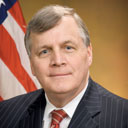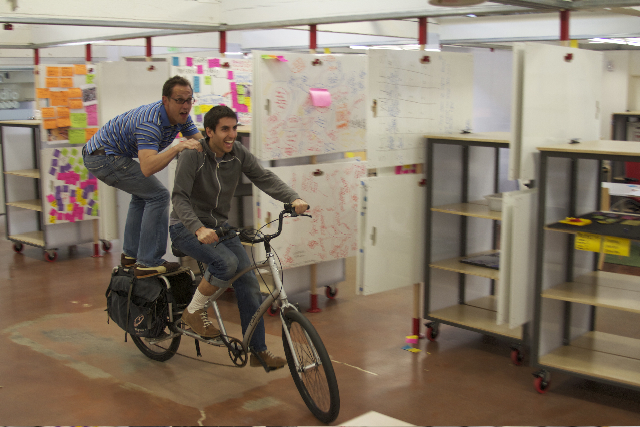 April 27 (Bloomberg) -- To understand why today’s crisis
is a truly terrible thing to waste, consider the Panic of 1873,
says Richard Florida
in his latest ode to economic innovation,
“The Great Reset.”
April 27 (Bloomberg) -- To understand why today’s crisis
is a truly terrible thing to waste, consider the Panic of 1873,
says Richard Florida
in his latest ode to economic innovation,
“The Great Reset.”
That distant crisis boiled up from a sadly familiar bust in mortgages and building in Europe. It then rolled across the Atlantic to the U.S., where Jay Cooke & Co. collapsed, triggering the fall of other financial firms. The Long Depression had begun. Iron mills shut down; railroads went bankrupt; jobs evaporated, sowing hunger and homelessness. The economy contracted for 65 months.
Yet when we think of that epoch today, we usually recall a brighter legacy: a burst of revolutionary technologies such as Thomas Edison’s light bulb and first power station, Alexander Graham Bell’s telephone, George Westinghouse’s electric transformer. What happened in these dark years?

 We've been having, let's say, some "interesting" interactions with folks, when we asked them to talk about their innovative experiences with finance and accounting BPO.
We've been having, let's say, some "interesting" interactions with folks, when we asked them to talk about their innovative experiences with finance and accounting BPO. The 10th anniversary of World IP Day on April 26 provides us an opportunity to recognize that protecting intellectual property rights is vital to America's economic prospects — both here at home and in markets around the world. As the theme of this year's celebration, "Innovation — Linking the World," reflects, new and innovative technologies and creative advancements play a vital role in breaking down international borders and in creating and sustaining economic growth. Intellectual property is one of America's greatest assets and its protection is central to our economic prosperity and security as well the public's health and safety. Aggressive intellectual property law enforcement is crucial to our continued success and safety, and is a top priority of the Department of Justice.
The 10th anniversary of World IP Day on April 26 provides us an opportunity to recognize that protecting intellectual property rights is vital to America's economic prospects — both here at home and in markets around the world. As the theme of this year's celebration, "Innovation — Linking the World," reflects, new and innovative technologies and creative advancements play a vital role in breaking down international borders and in creating and sustaining economic growth. Intellectual property is one of America's greatest assets and its protection is central to our economic prosperity and security as well the public's health and safety. Aggressive intellectual property law enforcement is crucial to our continued success and safety, and is a top priority of the Department of Justice. Businesses that create and rely upon intellectual property, from large entertainment conglomerates to small biotech firms, make up among the fastest-growing sectors of the U.S. economy. These industries also represent a significant portion of U.S. exports, with intellectual property now comprising a significant — and growing — share of the value of world trade. The proliferation of worldwide Internet access and advances in traditional distribution methods, such as transportation and shipping, now allow American businesses of all sizes to market their intellectual property throughout the world. Digital content, whether embodied in software, books, games, movies or music, can be transmitted from one corner of the world to another almost instantly.
Businesses that create and rely upon intellectual property, from large entertainment conglomerates to small biotech firms, make up among the fastest-growing sectors of the U.S. economy. These industries also represent a significant portion of U.S. exports, with intellectual property now comprising a significant — and growing — share of the value of world trade. The proliferation of worldwide Internet access and advances in traditional distribution methods, such as transportation and shipping, now allow American businesses of all sizes to market their intellectual property throughout the world. Digital content, whether embodied in software, books, games, movies or music, can be transmitted from one corner of the world to another almost instantly. VATICAN CITY (AP) -- Pope Benedict XVI said Saturday the Internet and the ongoing process of media convergence carry a risk of conformity of thought and control.
VATICAN CITY (AP) -- Pope Benedict XVI said Saturday the Internet and the ongoing process of media convergence carry a risk of conformity of thought and control.
 More than 800 giant wind turbines
More than 800 giant wind turbines



 Eat less saturated fat: that has been the take-home message from the
U.S. government for the past 30 years. But while Americans have
dutifully reduced the percentage of daily calories from saturated fat
since 1970, the
Eat less saturated fat: that has been the take-home message from the
U.S. government for the past 30 years. But while Americans have
dutifully reduced the percentage of daily calories from saturated fat
since 1970, the 
 In the emerging
In the emerging  A few years ago North Dakota erected some clever signs at its border with Montana. One sign advised anyone headed west to remember what happened to a certain long haired cavalry commander who left North Dakota in 1876 and ended up in a sorry state on the banks of the Little Big Horn in Montana.
A few years ago North Dakota erected some clever signs at its border with Montana. One sign advised anyone headed west to remember what happened to a certain long haired cavalry commander who left North Dakota in 1876 and ended up in a sorry state on the banks of the Little Big Horn in Montana.
 NEW YORK (CNNMoney.com) -- To motivate the well-off to funnel more of their cash into small businesses, should the federal government offer investors new tax breaks?
NEW YORK (CNNMoney.com) -- To motivate the well-off to funnel more of their cash into small businesses, should the federal government offer investors new tax breaks? Dropbox is a "hard drive in the clouds," says the hot Silicon Valley startup's very humble founder and CEO, an MIT grad named Drew Houston.
Dropbox is a "hard drive in the clouds," says the hot Silicon Valley startup's very humble founder and CEO, an MIT grad named Drew Houston.